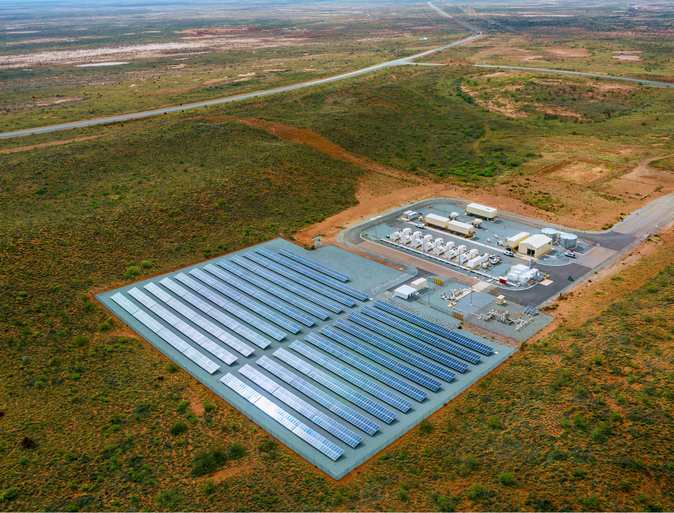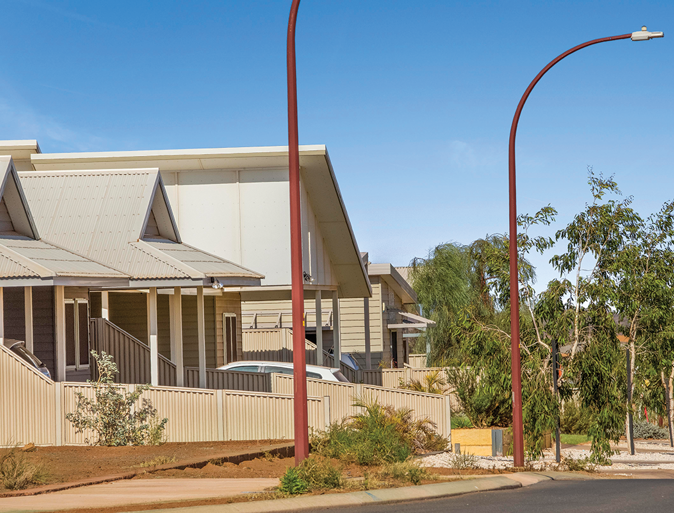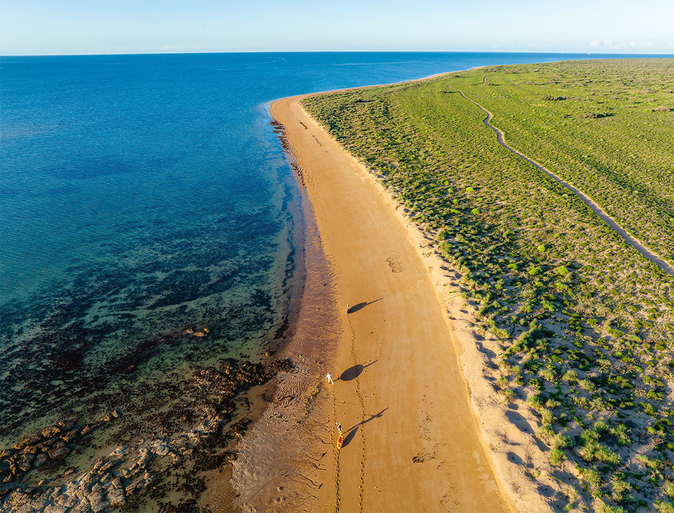
How does Onslow's current system work?
Onslow’s power supply is generated using a mix of gas and diesel generators, a 1 MW centralised solar farm located next to the power station, two battery energy storage systems (BESS), and customer-installed rooftop solar and batteries.
Renewable energy currently supplies around 17% of Onslow’s electricity needs. While this hybrid system has improved reliability and increased renewable integration, it still produces around 20,000 tonnes of CO₂ emissions each year, highlighting the need for larger-scale renewable solutions.
Community engagement
Communities are at the heart of our Future Energy System planning framework and ensure active participation among all stakeholders, including residents, Traditional Owners, businesses, and community groups throughout the process.
We consider community aspirations, existing infrastructure, and factors like land, heritage, and the environment to align planning with Onslow's unique characteristics.
Our approach includes informing, consulting, incorporating input, and communicating back to the community. A range of engagement methods will be used ensuring all stakeholders have an opportunity to contribute.


What's happening now?
We’re currently in the Future Energy System options analysis phase for Onslow. This involves detailed technical and financial assessments, market testing, engineering studies, land evaluations, community and stakeholder engagement, and environmental and heritage due diligence.
As planning progresses, we’ll continue to share updates and work closely with the Onslow community and Traditional Owners to ensure the future energy system meets local needs.
-
Why did we choose Onslow for this Decarbonisation project?
Onslow’s power needs are growing rapidly with the arrival of new customers. While Horizon Power commissioned the current power station and 1 MW solar farm in 2019, forecasted demand is expected to exceed the network’s capacity within the next few years. This project will help meet future demand while increasing renewable energy use and reducing carbon emissions.
Onslow’s electricity is currently generated using gas, diesel, battery storage, and customer-installed rooftop solar, producing approximately 20,000 tonnes of CO₂ annually. Increasing renewable generation will significantly reduce these emissions and support WA’s decarbonisation targets.
-
What renewable energy does Onslow already have?
Onslow currently has a 1 MW utility-scale solar farm located adjacent to the Onslow Power Station, along with two Battery Energy Storage Systems (BESS). In addition, many residents and businesses have installed rooftop solar systems, supported by Horizon Power’s Distributed Energy Resource Management System (DERMS), which allows for safe and efficient integration of customer-owned solar.
-
How does this affect me?
Communities are at the heart of our Future Energy System planning framework, and all members of the community are invited to provide their feedback.
The procurement process will include criteria for local employment and contracting opportunities, ensuring regional businesses and Traditional Owners have an opportunity to participate in the project’s delivery.
-
What renewable sources will be considered for Onslow?
A decarbonisation solution looks at cleaner energy sources such as solar and wind generation, coupled with battery energy storage solutions and consideration must be made to ensure the products are technologically and commercially readily available. In the initial stages of the project, we’ll assess which of these generation types are most viable for the Onslow community’s energy requirements.
We are assessing a large-scale solar farm with battery energy storage (ranging from 8 MW to 27 MW of solar and 12 MWh to 84 MWh of battery capacity). This could achieve between 42% and 80% renewable penetration for Onslow’s future energy system.
Community engagement helps us understand each town’s appetite for renewable energy, and feedback will inform the final solution. It’s important to note that while the new system may reduce reliance on fossil fuels, thermal generation may still play a role in meeting demand and supporting reliability during periods of low renewable generation or other challenging conditions. -
What is the size and scale of the proposed solar farm and battery system?
The proposed Onslow development is likely be between 8 MW and 16 MW in size. By comparison, Horizon Power’s Exmouth solar farm is 9.6 MW in size and has a footprint of 15 hectares.
-
What is Future Energy System planning framework?
Future Energy System planning framework is a public process in which Horizon Power works together with our communities and stakeholders to identify and explore energy options to shape their future energy system.
We engage and inform local communities, Local Government Authorities, Traditional Owner groups and key stakeholders to determine long-term energy solutions that best meet their needs. This includes seeking support on acquiring land on which to build the generation facility. We work to balance the demand, reliability and future energy needs of our towns with the voices and opinions of those who help make it a community. -
Do you intend to acquire land for this project?
Yes. The availability of land that can be used is a crucial factor in determining the future energy solution.
Renewable generation facilities such as a wind or solar farm require far larger footprints of land compared to a diesel- or gas-powered facility. The amount of land available determines the percentage of the town’s energy generated from renewable sources.
If we are unable to acquire land, we substantially reduce the amount of renewable generation options available for the town. -
When are we likely to see this project delivered?
Planning for a future energy system is complex and takes time and community engagement to gather opinions and thoughts. If the recommended system is approved for delivery, construction would likely commence in 2028.
-
Does this mean my power bills will reduce?
The price of electricity is set by the State Government. Under the WA Uniform Tariff Policy, all small-use electricity customers (households and small businesses) pay the same rate, no matter where they live. This government-funded policy heavily subsidises the higher costs of supplying power to remote and regional areas, ensuring customers are not disadvantaged by their location.
While introducing more renewable energy in Onslow may reduce the cost of supplying electricity to the town, it will not directly change your power bills, which remain set under the Uniform Tariff Policy.
-
Will hydrogen form part of the future energy system solution?
We have considered hydrogen on several recent projects and will continue to explore hydrogen as a viable future energy solution. At the current time:
- It is too costly to produce hydrogen onsite for use
- There are no reliable suppliers to deliver hydrogen as a fuel source.
-
Does Horizon Power intend to recycle any of its assets such as solar panels and batteries?
During the procurement process, Horizon Power will assess contractor efforts in recycling materials. We investigate how a contractor sources, and disposes of, the renewable components to be used in the construction of a renewable energy facility.
-
What about the environmental impacts?
Flora and fauna surveys conducted in May 2024 found no significant ecological constraints.
An Environmental Management Plan will guide construction and operation, overseen by a site-based Environmental Officer and subject to government environmental approvals.
-
What procurement opportunities will be available to local businesses for the project?
Our focus remains on achieving positive local procurement outcomes. A market testing process using Horizon Powers pre-qualified IPP/EPC suppliers list will be conducted to provide solutions and cost data for Onslow’s future energy system. This process will include assessment of opportunities for local and Aboriginal businesses.
What's happening and when?
Here's a high level timeline of what to expect, subject to change as the project progresses.
April to July 2023
The project team is formed, planning and preparation work begins.
Aug 2023 to Dec 2025
Financial assessment, market testing, engineering, land assessments, stakeholder engagement, project management, environmental and heritage due diligence activities will occur.
Sept to Dec 2025
Community engagement
We host local community sessions and present at regional events so you can learn more about the project, ask questions and provide feedback. If you have something to say, please get in touch via the contact form on this page.
Jan to Mar 2026
Project recommendation
Horizon Power Executive will review the project's recommendation and make a decision on the path forward.
2026 to 2027
Future Energy System Plan Implementation
Includes return to market for detailed design, commercial negotiations and final environmental approvals.
2027
Investment decision
Horizon Power Executive will review the project's recommendations and approvals pathway for Final Investment Decision.
2027 to 2028
Design & Deliver Future Energy System
This stage includes final design, construction, installation and commissioning of the future energy system.
2029
Project completed
The future energy system and supporting infrastructure will be operational, providing long-term, reliable, safe and sustainable power to your town.
Horizon Power acknowledges the Traditional Custodians throughout Western Australia and their continuing connection to the land, waters and community. We pay our respects to all members of the Aboriginal communities and their cultures; and to Elders past, present and emerging.
Aboriginal and Torres Strait Islander people are advised that this website may contain images, names or voices of deceased people.